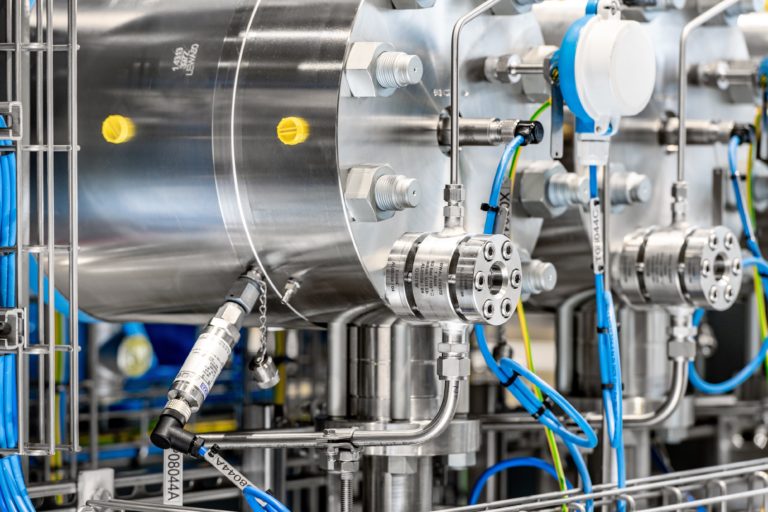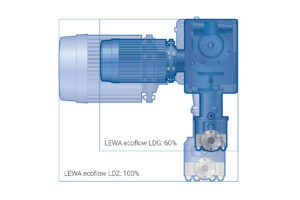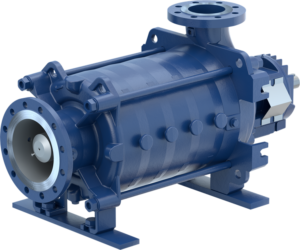Digital Factory: Smart Monitoring Tracks Pump Operation and Provides Operating Figures

The measured values come from a structure-borne sound transmitter located on the pump body, a pressure transmitter connected to a pressure measuring bore, and a rotary encoder adapted either directly via the crank shaft or the engine. Here you can see the pressure transmitter. (Image source: LEWA GmbH)
The continuous operation of pump systems in critical applications goes hand-in-hand with high expenditures for monitoring and maintenance. Recording plant operating parameters such as flow rate, temperature or pressure also often requires additional expensive and high-maintenance instrumentation. For this reason, LEWA GmbH, as a specialist for pump systems, has developed Smart Monitoring for its ecoflow and triplex models: A combination of sensors integrated into the pump and software-based evaluation provides the user with comprehensive information on the performance and condition of the pumps. Malfunctions and wear development are detected before they lead to unscheduled shutdown. This way, the service life of the pumps can be increased and maintenance can be planned more easily. LEWA also offers data analysis as a service. Here, customers not only receive a data-based assessment of the condition and operating efficiency of the pump, but also optimization recommendations for the entire system.
More complex production processes require more pump know-how
For reliable use of pumps and pump systems in everyday industrial applications, regular inspection of the units is absolutely essential. Wear and malfunctions must be detected before costly unplanned shutdowns occur. Time-consuming inspection rounds are thus the basis for repairs and maintenance work, but do not always capture all functional deviations. Because the requirements are increasing due to ever more complex production processes, the specific pump know-how of the operator is continuously decreasing. For these reasons, companies are turning to digital assistance systems to control and monitor the entire production line. But only if the plant components can also be integrated into these systems by means of interface integration and characteristic value transmission, the step towards the smart factory – the digitized production facility – can be taken.
Smart monitoring for networked pump monitoring
To meet these challenges, LEWA GmbH, as a pump specialist with experience in critical applications, has developed a product for complete and networked pump monitoring: "Smart monitoring provides information about the performance and condition of the ecoflow and triplex metering and process diaphragm pumps based on up to 13,000 sensor signals processed per second," explains Sebastian Gatzhammer, Development Engineer at LEWA. "In the process, data on structure-borne noise, hydraulic pressure, temperature and angle of rotation is collected by multiple sensors and processed by our software to come up with meaningful key figures."
This system largely serves as a replacement for inspection rounds, since digital monitoring immediately detects wear and malfunctions on both the fluid and hydraulic sides and reports them to a process control system at the operator via the interface. "This means that around 90 percent of malfunctions can be detected at an early stage: for example, overpressure in the hydraulics, worn plunger rings or incorrect closing behavior of valves," says Gatzhammer. Faults in the entire system beyond the LEWA unit are also measured indirectly. "We can use the pump data to interpret changes in the condition of the pumped fluid, possibly due to contamination," Gatzhammer adds.
30 different diagnoses volume flow measurement without additional instrumentation
However, detailed monitoring also results in other advantages such as better planning of maintenance intervals. The plant control center learns of any functional deviation in real time so that maintenance can be planned in advance and carried out in a controlled manner. In potentially explosive working areas, this also means a significant increase in safety: "Possible accidents are prevented and overall plant availability increases significantly," reports Gatzhammer. "By monitoring up to 30 different diagnoses, the technical management always has an overview." This was possible because the Smart Monitoring System is the product of more than 60 years of LEWA's pump expertise. "With the interaction of sensors and hardware, we can detect as little as a one percent drop in flow rate in each pump head," Gatzhammer said. "But thanks to the structure-borne sound characteristics, we even detect signs of wear on valves at a very early stage, before they even become measurable in the flow rate of the system."
Added value through data analyses – data sovereignty with the operator
LEWA offers data analysis for the smart monitoring systems. "We analyze and evaluate the operational data that a system has collected over a period of time. This allows us to do more than just provide the customer with data-based recommendations for maintenance planning based on wear patterns. The overall plant efficiency can also be optimized in this way," explains Gatzhammer. The data is transferred via standardized interfaces such as OPC UA to process control systems for data acquisition and visualization. In addition, the Smart Monitoring System is already cloud-ready and can be networked with other systems via the Microsoft Azure cloud. However, this decision – and thus also the data sovereignty – always lies with the operator.
After successful completion of the pilot phase, the LEWA Smart Monitoring launch is planned for mid of October 2021.
Source: LEWA GmbH







